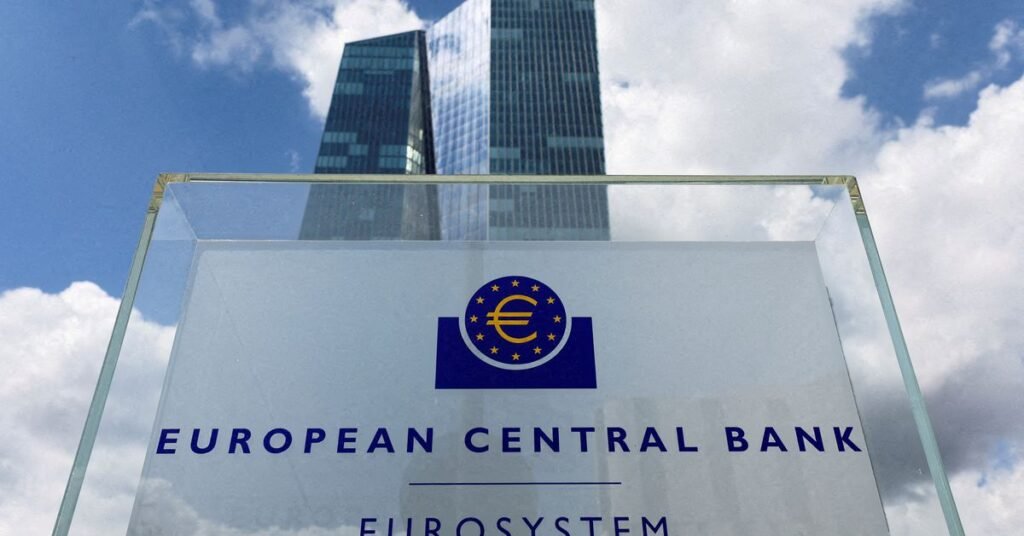FRANKFURT, March 2 (Reuters) – Huddled in a retreat in a distant Arctic village, European Central Financial institution policymakers confronted up final week to some chilly exhausting information: firms are cashing in on excessive inflation whereas employees and shoppers foot the invoice.
The prevailing macroeconomic narrative over the previous 9 months has been that sharp will increase in costs for all the things from power to meals to laptop chips had been ramping up prices for firms within the 20 international locations that make up the euro zone.
The European Central Financial institution (ECB) responded by elevating rates of interest by essentially the most in 4 a long time to chill demand, arguing it confronted the chance that increased shopper costs would push up wages and create an inflation spiral.
However on the retreat within the Finnish village of Inari meant to present the financial institution's Governing Council an opportunity to delve into themes solely touched upon at common conferences, a barely totally different image emerged, three sources who attended the assembly mentioned.
Newest Updates
View 2 extra tales
Information articulated in additional than two dozen slides offered to the 26 policymakers confirmed that firm revenue margins have been rising somewhat than shrinking, as could be anticipated when enter prices rise so sharply, the sources informed Reuters.
An ECB spokesperson declined to remark for this story.
“It is clear that revenue enlargement has performed a bigger function within the European inflation story within the final six months or so,” mentioned Paul Donovan, chief economist at UBS International Wealth Administration. “The ECB has did not justify what it is doing within the context of a extra profit-focused inflation story.”
The concept firms have been elevating costs in extra of their prices on the expense of shoppers and wage earners is more likely to anger most of the people.
However it has implications for central bankers too.
Inflation fuelled by increased company margins tends to self-correct as firms finally put the brakes on value rises to keep away from shedding market share, making it a really totally different beast to tame than a wage-price stampede.
So a brand new inflation narrative centered on margins might give the extra dovish members of the Governing Council some ammunition to battle towards additional price rises after their resistance proved largely futile over the previous 12 months, in line with economists interviewed by Reuters.
The controversy is because of resume on the ECB's subsequent coverage assembly on March 16, when the financial institution has promised to lift charges to their highest stage for the reason that top of the monetary disaster in 2008.
CHANGE IN NARRATIVE
The obtained inflation narrative within the euro zone has been slowly beginning to shift.
Companies are anticipating smaller value rises because the outlook for prices and demand turns into much less clear, in line with surveys printed by the ECB and Germany's Ifo institute.
Some European international locations similar to Greece have tabled measures to curb inflation in essential goods whereas France and Spain are debating related steps.
“The economics of profitability recommend we'd see extra of a revenue squeeze developing,” ECB chief economist Philip Lane informed Reuters. “European companies know that in the event that they increase costs an excessive amount of, they'll undergo a loss in market share.”
In the USA, the revenue margin enlargement began earlier and has already began to reverse, albeit slowly and inconsistently.
However in contrast to the USA, there is no such thing as a official company margin information for the euro zone. As a substitute, nationwide accounts and earnings stories from listed firms are getting used as proxies to color the inflation image.
Euro zone shopper good firms, for instance, boosted working margins to a median of 10.7% final 12 months, up by 1 / 4 over 2019, earlier than the worldwide pandemic and the battle in Ukraine, Refinitiv information shows.
The 106 firms included within the survey ranged from French resort proprietor Pierre et Vacances (PVAC.PA) to carmaker Stellantis (STLAM.MI) to luxurious items group Hermes (HRMS.PA) and Nordic retailer Stockmann (STOCKA.HE).
Equally, earnings somewhat than labour prices and taxes have accounted for the lion's share of home value pressures within the euro zone since 2021, in line with ECB calculations primarily based on Eurostat information.

DETACHED DISCOURSE
Certainly, wages have been rising much more slowly than inflation, implying a 5% drop in the usual of residing for the common worker within the euro zone in contrast with 2021, in line with ECB's calculations.
That is just about the other of the wage-led inflation that characterised the Seventies, an period which has develop into essentially the most broadly used level of comparability within the public debate about applicable central financial institution coverage responses, economists say.
“The general public discourse to some extent is indifferent from what's really taking place on the market,” mentioned Philipp Heimberger, an economist on the Vienna Institute for Worldwide Financial Research. “The principle story of the dangers going ahead continues to be that there is a looming wage-price spiral which ought to make the central financial institution much more aggressive in climbing rates of interest.”
For instance, wages had been talked about 14 instances in ECB President Christine Lagarde's newest news conference whereas margins did not get a single point out. Her deputy, Luis de Guindos, additionally warned that the ECB wanted to watch out as a result of labour unions would possibly demand extreme pay rises.
“You see a really clear reluctance to debate revenue,” Daniela Gabor, a professor of economics and macro-finance on the College of West England in Bristol. “That illustrates that the distributional politics of inflation concentrating on is: You do not go for earnings; you do not go for capital.”
In the USA, the difficulty of runaway margins has been raised by former Federal Reserve Financial institution vice-chair Lael Brainard, who's now President Joe Biden's high financial adviser, and Democratic senators Elizabeth Warren and Bernie Sanders.
Even contained in the ECB, labour representatives demanding increased pay for central financial institution employees have distanced themselves from what they described because the establishment's “anti-worker bias”.
They cited, amongst others, a paper by researchers on the Worldwide Financial Fund exhibiting that accelerating wages haven't traditionally led to a wage-price spiral.
PROFIT VS WAGES
ECB policymakers gathered in Finland went via related information units exhibiting that earnings had outpaced wages due to financial savings constructed up throughout lockdowns being spent, but additionally due to firms' energy to set costs, the sources mentioned.
With these financial savings now being depleted and competitors returning, issues could also be altering for ECB policymakers who've been calling for a redrafting of the inflation narrative.
In January, Portuguese central financial institution governor Mario Centeno was among the many first to warn in regards to the danger of a really clear improve in revenue margins, saying it must be introduced up the European coverage agenda.
ECB board member Fabio Panetta later mentioned employees had borne the brunt of the surge in costs whereas, on stability, firm mark-ups had remained secure, and even elevated in some sectors.
Wages are accelerating, with the ECB's forward-looking wage tracker anticipating an increase of practically 5% in 2023 for contracts signed within the final quarter of 2022. However that will not offset the huge drop in actual wages over the previous 12 months, analysts mentioned.
“A key lacking ingredient is the bargaining energy of the labour motion, which is structurally weakened by the disinflation insurance policies of the Nineteen Eighties and the following liberalisation of labour markets,” mentioned Mattias Vermeiren, a professor of worldwide political economic system on the Ghent Institute for Worldwide and European Research.
Over the past inflation disaster within the Seventies, practically 70% of financial output went to workers, with simply over 20% going to earnings, in line with Eurostat information. Now, labour's share stands at 56% with a 3rd going to earnings.
The ECB policymakers went over these variations at their Finnish retreat, although their tentative conclusions had been dotted with caveats, the sources who attended the assembly mentioned.
Some argued that furlough schemes through the pandemic could buttress incomes, the sources mentioned, and {that a} sustained interval of excessive inflation could increase wage calls for in a means that fashions developed in periods of secure costs fail to foretell.
And the rate of interest doves might need their work lower out after information confirmed inflation in France, Spain and Germany exceeded expectations final month.
Extra reporting by Balazs Koranyi, Chris Steitz, Philip Blenkinsop, Victoria Klesty, Joanna Plucinska and Thomas Leigh; Modifying by David Clarke
: .

